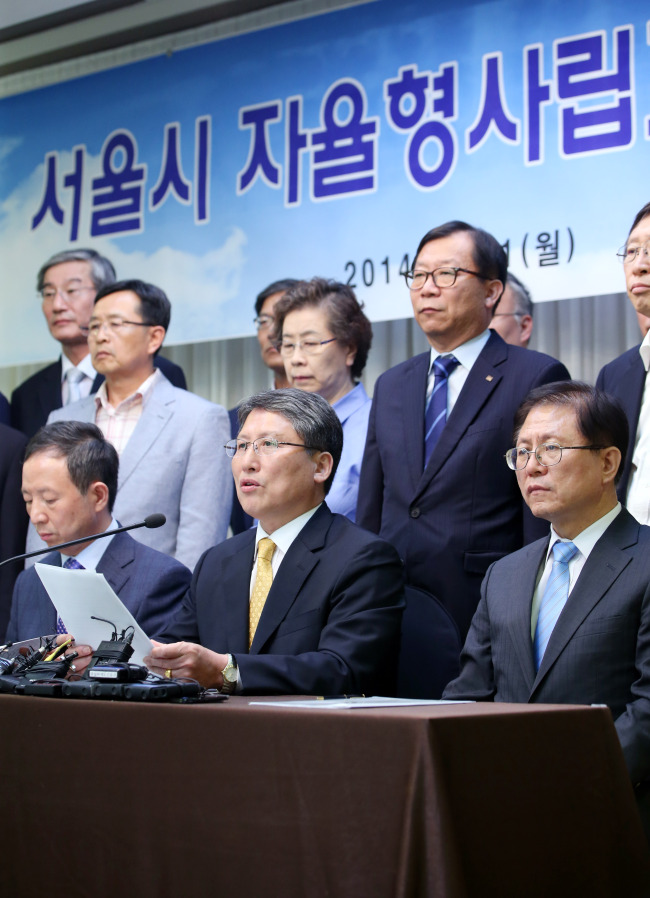A local education office on Tuesday made a move to turn one of its elite high schools into a regular one on Tuesday, hinting at a potential all-out feud between the government and education superintendents over the autonomous private high school system.
Dongsan Christian High School, located in Ansan, fell short of standards required for an autonomous private high school, according to the Gyeonggi Provincial Office of Education. The GOE sent the report to the Education Ministry, effectively taking measures to revoke Dongsan’s status as an elite school.
Autonomous private high schools are granted free reign over their operations and curriculum in exchange for not receiving government subsidies. Their tuitions are up to three times higher than those of ordinary schools, and they have the right to select their own students via interviews.
 |
Principals of autonomous private high schools in Seoul protest the Seoul education office’s policy to gradually abolish the elitist schools at a press conference on Monday in central Seoul. (Yonhap) |
A GOE official said that he cannot conclusively say that Dongsan will be stripped of its privileges, but its chances of being redesignated are slim. The school raised questions over fairness of the GOE’s evaluation.
But the education office still has hurdles to clear before going through with the procedure.
“The ministry will look over both the process and results (of the evaluation) and it is possible that the government will not agree with the GOE’s decision,” a ministry official said.
The law states that education superintendents need to first consult the government before revoking the designation. The authorities are expected to reach a decision on the school by early August.
Dongsan, however, is merely a prelude to many conflicts to come.
The majority of newlyelected education superintendents are known as “progressives,” including Gyeonggi Education chief Lee Jae-jung. They have vowed to implement a more egalitarian system, focusing more on fostering students’ creativity rather than competition.
One of their key goals was to abolish autonomous schools. They have blamed the falling standards of public schools on the elitist system, which allegedly provides quality education only for those with fat wallets.
Seoul education chief Cho Hi-yeon recently said he will provide financial support of up to 1.4 billion won ($1.37 million) over the next five years for any autonomous private school that voluntarily switches to a regular public school.
“The decline of regular high schools commenced in the early 2000s. It is not right to point fingers at the autonomous schools,” said Kim Yong-bok, principal of Paichai High School in eastern Seoul and the head of an association of principals from autonomous private high schools in Seoul.
He added that the principals will pursue legal action if the superintendents push ahead with canceling the designations.
Cho claimed Tuesday that the education superintendents have the final say in cancelling the designation of an autonomous school because while the law mandates they consult the Education Ministry, it does not say the government’s permission is needed.
He is currently mulling whether to take away the autonomous private schools’ right to pick their own students, which is key to retaining the elite status. The Education Ministry opposed the idea, saying that decision should be made at the ministerial level.
It is unlikely that the ministry will give up autonomous private high schools, as it expects them to raise the overall standards of secondary education and provide diverse education. This means the government is expected to bang heads with progressive education chiefs who are adamant on abolishing the elitist schools.
Of the 49 autonomous private high schools across the country, 25 are subject to evaluation this year. Late Tuesday, a civic group against the proliferation of private education claimed that 16 of these 25 high schools do not meet the standards that needed to retain the status.
By Yoon Min-sik (
minsikyoon@heraldcorp.com)








